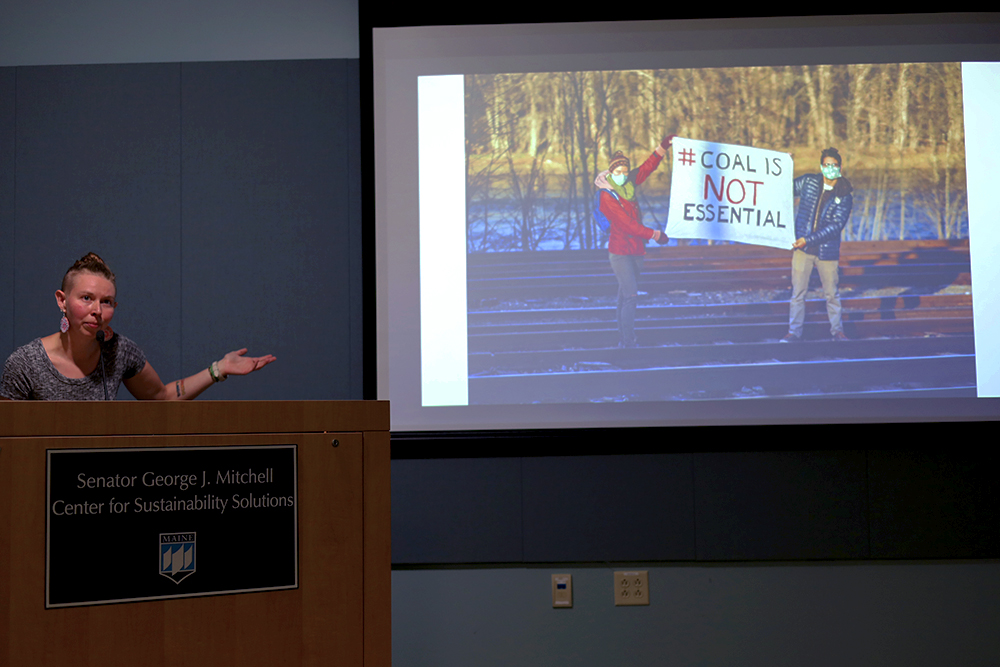Dr. Sonja Birthisel, a devoted activist and the director of the Wilson Center, joined the Mitchell Center for Sustainability Solutions on Monday, Sept. 19 for a presentation about the broken systems of our generation and how we, as individuals, have the power to pursue positive change.
Birthisel completed her Ph.D. research at the University of Maine, where she conducted innovative work on sustainable agriculture as well as contributed to a major report on the potential of natural climate solutions. The Mitchell Center was an early investor for her seed grant.
Birthisel began the discussion by providing a personal history that related to her involvement in the cause. She became passionate about world hunger at a young age after the concept was introduced to her in Sunday school. She grew up in Maine Organic Farming and Gardening Association circles before moving to Iowa, which was industrially and environmentally degrading due to a transformed landscape. This was shockingly different from the community she was accustomed to, which values resiliency and caring for one another on a local scale.
Through her studies of ecology and environmental science, Birthisel grew a passion for combatting broken food systems and climate change. What we as a society lack is not data, but more so a willingness to do something to solve the issues at hand.
The first topic introduced was the observed impacts of climate change. She elaborated on how our planet is currently on a trajectory toward the continuation of excessive heat, malnutrition, mental health disorders, displacement and infectious disease. She depicted this information to us through charts and visual aids.
The second topic delved into how these issues can feel demoralizing at times. Many corporations are profit-driven with a disregard for the earth’s well-being which contributes to broken systems such as food, and societal dependence on automobiles and courts.
Citizens United provides companies with the same free speech rights that we have been granted as individuals — meaning money has a voice, contributing a perspective that is considerably worse than that of a singular person. Birthisel then described the challenges related to informational ecosystems, specifically the inertia of the status quo.
“As a society, we have some learning to do about power and authority and how it is that individuals can actually step up and make a difference,” Birthisel said.
There is a duality between the feeling that everything rests upon the individual in our culture and incredible disempowerment and smallness within our systems. As a scientist, Birthisel had previously struggled with the pressure to conform as a distributor solely of facts, preserving certain neutrality and objectivity to the data at hand.
Roger Pielke Jr. developed a categorization that scientists could potentially fall under. The first is a pure scientist, who seeks to focus only on facts, and has no intention with the decision maker. They are agnostic to the data’s effect on the world. Next is the science arbiter, someone who answers specific factual questions posed by the decision maker. The issue advocate, however, seeks to reduce the scope of choice available to the decision maker. Lastly is an honest broker of policy options. They intend to expand, or at the very least, clarify the scope of choice available to the decision maker. Through the presentation of multiple alternatives, the honest broker is potentially able to empower decision-makers to bring information to higher levels of utility. This action can be achieved through the implementation of natural climate solutions such as reducing tillage, dairy mineral management or reparation buffers.
“I am trying to, with my colleagues, provide policymakers with a range of possibilities and information about how much greenhouse mitigation could be attained as well as the price point,” Birthisel said.
Her next topic of discussion was respectability, and how it is a currency we can spend. Birthisel’s credentials as a scientist compel our community to regard her as a trusted source of information. She chooses to spend this currency via activism.
For example, on Sept. 28, 2019, she participated in Bow Mass Action, a protest seeking to eliminate the use of coal as an energy source in New England. The goals of this campaign were to build unity and community as well as demonstrate what is possible. That protest was only the beginning and it was used as a starting point to pursue other challenges such as intersectionality and racial justice affiliated with these communities of resistance.
Birthisel described how there is a line between an issue advocate and an honest broker who can be considered an honest issue advocate. She showed the audience a Venn diagram that was presented to a group of middle school students wanting to help the cause but feeling insignificant and innately powerless. This model for personal sustainability reveals the possibility of using one’s unique gifts that essentially overlap the world’s infinite needs.
Birthisel concluded her presentation with a piece of advice for the audience.
“Within these times of rapid technological and social change, don’t be afraid to reinvent yourself or explore different options beyond traditional career paths as you figure out who and what you want to be in the world,” Birthisel said.








